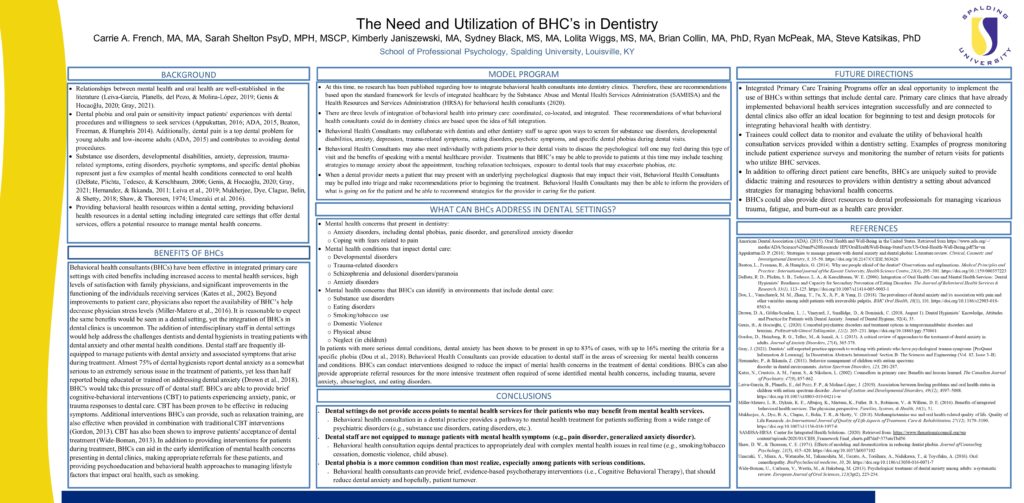The coronavirus pandemic (COVID-19) has led to the need for increased precautions in dental practices and other healthcare settings. Many dentists report practice modifications during COVID-19 to continue providing safe patient care (Ahmed et al., 2020). At the same time, relationships have been found between mental health and oral health (Leiva-García, Planells, del Pozo, & Molina-López, 2019; Genis, & Hocaoğlu, 2020; Gray, 2021). In primary care, integration of behavioral health services through the use of behavioral health consultants has been successful at increasing access to mental health services and providing a resource for early detection of serious mental health concerns. Although relationships exist between oral health and mental health, there has been limited exploration of the potential benefits of integrating mental health providers into dental practices. Substance use disorders, developmental disabilities, anxiety, depression, trauma-related symptoms, eating disorders, psychotic symptoms, and specific dental phobias represent just a few examples of mental health conditions that have a relationship to oral health (DeBate, Plichta, Tedesco, & Kerschbaum, 2006; Genis, & Hocaoğlu, 2020; Gray, 2021; Leiva et al., 2019; Mukherjee, Dye, Clague, Belin, & Shetty, 2018; Shaw, & Thoresen, 1974; Umezaki et al. 2016). While there are relationships established by the literature between mental health and oral health some practitioners report challenges related to making appropriate mental health referrals (DeBate et al., 2014). Additionally, although a relationship is well-established between Autism Spectrum Disorder (ASD) and other developmental disabilities and poor oral health combined with behavioral challenges when visiting the dentist, research remains somewhat limited on effective ways to manage behavior concerns when individuals with ASD and other developmental disabilities present for dental exams and procedures (Kemp, 2005; Leiva-García, 2019, Newton, 2009). Behavioral health interventions have been successful at improving patients’ compliance with oral health recommendations and tolerance of dental procedures (Dermen et al. 2014; Shaw & Thoresen, 1974). Furthermore, many dental providers are receptive to person-centered approaches to dental care and adopting strategies to improve dental treatment for trauma survivors (Nowak, Buchanan, H., & Asimakopoulou, 2018; Kranstad, Søftestad, Fredriksen, & Willumsen, 2019). Given the established relationship between mental health and oral health, integrating behavioral health services with dentistry may offer an option that benefits patients and may have the impact of increasing access to mental health services. The Integrated Behavioral Health Scholars’ Program (IBHSP) provides psychology graduate students with the opportunity to receive supervised training experiences with integrated primary care. Graduate students receive training in multiple primary care clinics located in an urban are
Spring Virtual Conference April 17-18th | In-Person Annual Conference in San Antonio, TX Oct 24-26th


Leave a Reply